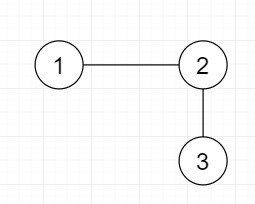
 Data Structure
Data Structure Networking
Networking RDBMS
RDBMS Operating System
Operating System Java
Java MS Excel
MS Excel iOS
iOS HTML
HTML CSS
CSS Android
Android Python
Python C Programming
C Programming C++
C++ C#
C# MongoDB
MongoDB MySQL
MySQL Javascript
Javascript PHP
PHP
- Selected Reading
- UPSC IAS Exams Notes
- Developer's Best Practices
- Questions and Answers
- Effective Resume Writing
- HR Interview Questions
- Computer Glossary
- Who is Who
Minimum edges required to add to make Euler Circuit in Python
Suppose we have an undirected graph of b number of nodes and a number of edges; we have to find minimum edges needed to build Euler Circuit in this graph.
So, if the input is like

then the output will be 1.
To solve this, we will follow these steps −
- Define a function dfs() . This will take g, visit, odd_vert, degree, comp, v
- visit[v] := 1
- if degree[v] mod 2 is same as 1, then
- odd_vert[comp] := odd_vert[comp] + 1
- for u in range 0 to size of g[v], do
- if visit[u] is same as 0, then
- dfs(g, visit, odd_vert, degree, comp, u)
- if visit[u] is same as 0, then
- From the main method do the following −
- g := a list of n+1 blank lists
- e := a new list
- := a new list
- degree := new list of size (n + 1) and fill with 0
- visit := new list of size (n + 1) and fill with 0
- odd_vert := new list of size (n + 1) and fill
- with 0
- for i in range 0 to m, do
- insert d[i] at the end of g[s[i]]
- insert s[i] at the end of g[d[i]]
- degree[s[i]] := degree[s[i]] + 1
- degree[d[i]] := degree[d[i]] + 1
- ans := 0, comp := 0
- for i in range 1 to n + 1, do
- if visit[i] is same as 0, then
- comp := comp + 1
- dfs(g, visit, odd_vert, degree, comp, i)
- if odd_vert[comp] is same as 0, then
- insert comp at the end of e
- otherwise,
- insert comp at the end of o
- if visit[i] is same as 0, then
- if size of o is same as 0 and size of e is same as 1, then
- return 0
- if size of o is same as 0, then
- return size of e
- if size of e is not same as 0, then
- ans := ans + size of e
- for i in range 0 to size of o, do
- ans := ans + odd_vert[i] / 2 (take only integer part)
- return ans
Example
Let us see the following implementation to get better understanding −
def dfs(g, visit, odd_vert, degree, comp, v): visit[v] = 1 if (degree[v] % 2 == 1): odd_vert[comp] += 1 for u in range(len(g[v])): if (visit[u] == 0): dfs(g, visit, odd_vert, degree, comp, u) def solve(n, m, s, d): g = [[] for i in range(n + 1)] e = [] o = [] degree = [0] * (n + 1) visit = [0] * (n + 1) odd_vert = [0] * (n + 1) for i in range(m): g[s[i]].append(d[i]) g[d[i]].append(s[i]) degree[s[i]] += 1 degree[d[i]] += 1 ans = 0 comp = 0 for i in range(1, n + 1): if (visit[i] == 0): comp += 1 dfs(g, visit, odd_vert, degree, comp, i) if (odd_vert[comp] == 0): e.append(comp) else: o.append(comp) if (len(o) == 0 and len(e) == 1): return 0 if (len(o) == 0): return len(e) if (len(e) != 0): ans += len(e) for i in range(len(o)): ans += odd_vert[i] // 2 return ans b = 3 a = 2 source = [ 1, 2 ] destination = [ 2, 3] print(solve(b, a, source, destination))
Input
b = 3 a = 2 source = [ 1, 2 ] destination = [ 2, 3]
Output
1

Advertisements
